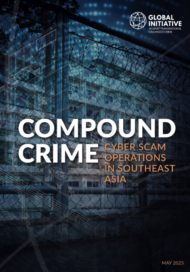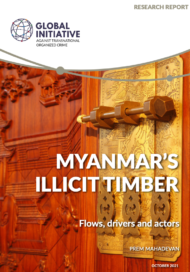Posted on 10 Oct 2025
In July 2025, a Chinese court opened a case against Bai Suocheng and his son Bai Yingcang, the former leaders of the Myanmar military’s Kokang Border Guard Force (BGF), for over 31 000 counts of online fraud involving US$1.48 billion of stolen funds, over US$2.5 billion in illegal online gambling proceeds, the production of 11 tonnes of illegal drugs and the murder of six Chinese nationals.
To accompany the court’s announcement, Chinese state media released a short documentary detailing how the Bais had transformed one of the main towns on the China–Myanmar border into a criminal stronghold. The film was framed as a public education tool to warn Chinese nationals about the risks of falling victim to fraud, and to demonstrate the success of the Chinese police in cracking down on crime. However, it avoided any mention of the critical role that Bai Suocheng played in the Myanmar military, the key role of Chinese officials in enabling his rise to power or the extent to which Myanmar’s ‘scamdemic’ has evolved since Bai’s fall.
Rewinding a couple of years, in 2023, the Chinese authorities had put maximum pressure on Myanmar’s senior general Min Aung Hlaing’s military regime to crack down on Myanmar’s industrial-scale scam centres, which were increasingly targeting Chinese nationals. When the Myanmar military refused to act, China intervened by supporting an offensive that brought down the Kokang BGF, causing the Myanmar military to lose control over one of the main border crossings. As northern anti-junta resistance forces began their final push into Kokang territory, Chinese police were already there, gathering evidence on the Bai family and preparing arrest warrants.
Several high-level Chinese officials were dispatched to demand the extradition of Myanmar’s BGF leaders for crimes committed against Chinese citizens, including those with close personal ties to Min Aung Hlaing, such as the Bais. However, following a series of resistance victories over Myanmar military forces in 2024, China’s position on its neighbour underwent a dramatic shift.
China’s strategic pivot
China’s public narrative on its fight against Myanmar’s scam industry emphasizes its tough stance on crime. But other aspects of the story have been carefully omitted, such as how government officials on the China side of the border became complicit in Bai’s establishment of one of the world’s largest fraud hubs, including how Chinese officials actively collaborated with the Kokang special administrative zone, forging business relations with Kokang leaders and hosting their companies in China. Especially notable by its absence has been any mention of the role of the Myanmar military – and Min Aung Hlaing himself – in building what is arguably one of the largest criminal enclaves in history.
This is because, in January 2024, China came to the realization that Min Aung Hlaing’s fragile regime was heavily reliant on transnational criminal actors such as the Kokang BGF. Had the Chinese government continued its campaign of condemnation, the chances of regime collapse would have risen significantly. Given that the majority of China’s economic projects in the country are under the control of the Myanmar military, and that China does not see a viable alternative to military rule, it moved from denouncing Min Aung Hlaing to staging political theatre and joint ‘crackdowns’ that legitimized the Myanmar military.
Law enforcement became a new focus of the bilateral relationship, and Beijing invited senior representatives of the Myanmar military regime to attend public events celebrating their so-called ‘landmark’ successes, including the repatriation of over 5 400 Chinese nationals involved in fraud. Although Min Aung Hlaing had deployed enormous military resources in late 2023 in an attempt to save his Kokang criminal empire, in 2024 the Chinese government was portraying the Myanmar police as heroes for their efforts in preventing fraud against Chinese citizens.
Today, the junta continues to rely heavily on the militias that are still operating hundreds of scam compounds across the country. Unprecedented levels of Chinese support have enabled the junta to recover strategically important territories from resistance forces, notably large portions of the main trade corridor from Ruili in China to Mandalay in Myanmar. The Chinese government has also granted full recognition to Min Aung Hlaing’s regime, with invitations to the Shanghai Cooperation Organization summit in Tianjin, to participate as a guest of honour at a victory day military parade, and to join China’s signature Global Public Security Cooperation Forum in Lianyungang. Min Aung Hlaing also met with Xi Jinping in Tianjin, where the Chinese president emphasized the countries’ ‘shared future’.
The rise of ‘patriotic’ scamming
China’s strategic pro-junta pivot presented a major challenge: how could the harm to tens of thousands of potential fraud victims be mitigated? China’s solution was to mobilize the police and courts to repatriate as many of the Chinese nationals working in Myanmar’s scam centres targeting other Chinese nationals as possible. Coordinating with various Myanmar armed groups and Thailand, China managed a surge of repatriations, and in 2024 alone state courts indicted over 78 000 people for online scamming, an increase of nearly 54% year-over-year.
However, this development revealed another problem: most Chinese nationals repatriated from scam centres are prosecuted and jailed to demonstrate the state’s zero-tolerance policy, but a criminal record makes it impossible for these people to find legitimate employment in China’s highly competitive job market, which leaves them with few options other than to fall back on their fraud-related skills.
As a result, Chinese scam operations have surged, with a twist. A new, ‘patriotic’ form of fraud has emerged: 杀洋盘 (shā yáng pán)’, a play on words based on the pig-butchering scam. ‘Chinese don’t scam Chinese … we only scam Japanese,’ boasted one scammer. ‘We only scam foreigners,’ was the motto of another. The phenomenon began to spread on an unprecedented scale – according to official records from a town in Shandong, one syndicate scammed over 66 000 Indian nationals between June 2023 and January 2024.
All in all, the Chinese clampdown has resulted in the conviction of over 120 000 people since early 2023. However, a significant number have been released, and some are now running in China small-scale, covert scam operations targeting foreign nationals from a wide range of countries, including the US, India and Japan. The degree to which this is a problem is underscored by the fact that the Chinese police have even resorted to initiating public education programmes stressing that ‘scamming foreigners is also a crime’.
In late September 2025, China made international headlines by sentencing a group of Kokang BGF elites to death. This ruling signals how Chinese courts may handle the cases of the Bais and the other Kokang BGF leaders awaiting trial. For the five main militia groups involved in running large-scale scam operations in Myanmar, this could set a precedent for reduced tolerance of scams targeting China. However, rather than contributing to the eradication of scam centres, it is likely to further accelerate the shift towards foreign, and particularly Western, targets.
These developments should be a major source of alarm for the global community, as China’s actions to gain a strategic advantage in its dealings with the Myanmar military will increasingly come at the rest of the world’s expense. Victimized countries must adopt proactive strategies to address this growing security threat, including holding China and the Myanmar military accountable for the growing global impact of ‘foreigner butchering’.



